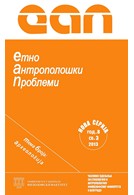Genius loci Balkani: recepcija prošlosti i konstruisanje akademskog narativa o balkanskom nasleđu
Genius Loci Balkani: Reception of the Past and the Construction of the Academic Narrative on the Balkan Heritage
Author(s): Vladimir D. MihajlovićSubject(s): Cultural history, Museology & Heritage Studies, Recent History (1900 till today), Sociology of Culture, 19th Century
Published by: Филозофски факултет, Универзитет у Београду
Keywords: ideology and interpretation of the past; Balkan Institute; classical past; cultural continuity; discourse of Balkanism; Balkan heritage; Ratko Parežanin; Milan Budimir; Petar Skok;
Summary/Abstract: Postcolonial and postmodern perspectives, entering the humanities over the last decades of the 20th century, have contributed to the awareness that the present European interpretations of the past have been strongly influenced by the social and ideological context of the 19th and 20th centuries. Consciously or otherwise, the pioneers of research into the Classical antiquities have perceived the object of their research through their own perception of the relations in the world that surrounded them, thus inscribing their contemporaneous values onto the past and using thus conceived past in understanding, explaining and justifying the modern social/cultural phenomena. This contribution poses the question to which extent the social trends in the Kingdom of Yugoslavia have inspired and enabled the creation of an academic narrative about the uniqueness of the Balkan lands, based upon the continuity with the "ancient humanism", and social/cultural values, (allegedly) defined at the times of Ancient Greece and Hellenism. The relationship is considered between the modern trends and the formation of academic issues in the case of social and political circumstances that coincided with the creation of the discourse of the "Balkan spirit". The narrative is considered from the times of its formation up to the present, as well as the reasons for its wide popularity both in the academic community and the general public.
Journal: Етноантрополошки проблеми
- Issue Year: 8/2013
- Issue No: 3
- Page Range: 779-803
- Page Count: 25
- Language: Serbian

